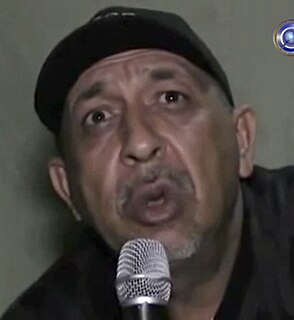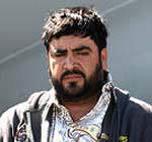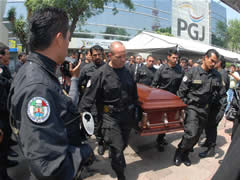MOVE is a black liberation group founded in 1972 in Philadelphia, Pennsylvania by John Africa and Donald Glassey, a social worker from the University of Pennsylvania. The name is not an acronym. The group lived in a communal setting in West Philadelphia, abiding by philosophies of anarcho-primitivism. The group combined revolutionary ideology, similar to that of the Black Panthers, with work for animal rights.

In criminal law, kidnapping is the unlawful transportation, asportation and confinement of a person against their will. Thus, it is a composite crime. It can also be defined as false imprisonment by means of abduction, both of which are separate crimes that when committed simultaneously upon the same person merge as the single crime of kidnapping. The asportation/abduction element is typically but not necessarily conducted by means of force or fear. That is, the perpetrator may use a weapon to force the victim into a vehicle, but it is still kidnapping if the victim is enticed to enter the vehicle willingly, e.g., in the belief it is a taxicab.

The Tijuana Cartel or Arellano-Félix Organization is a Mexican drug cartel based in Tijuana. The cartel once was described as "one of the biggest and most violent criminal groups in Mexico." However, since the 2006 Sinaloa Cartel incursion in Baja California and the fall of the Arellano-Félix brothers, the Tijuana Cartel has been reduced to a few cells. In 2016, the organization has become known as Cartel Tijuana Nueva Generación and has begun to align itself under the Jalisco New Generation Cartel, along with Beltrán Leyva Organization (BLO) to create an anti-Sinaloa alliance, in which the Jalisco New Generation Cartel heads, are creating a possible powershift in Mexico.

Andrés Manuel López Obrador is a Mexican politician serving as the president of Mexico since 2018.

Joaquín Archivaldo Guzmán Loera, commonly known as "El Chapo" because of his 168 cm stature, is a Mexican drug lord and former leader of the Sinaloa Cartel, an international crime syndicate. He is considered to have been the most powerful drug trafficker in the world.
The Juárez Cartel, also known as the Vicente Carrillo Fuentes Organization, is a Mexican drug cartel based in Ciudad Juárez, Chihuahua, across the Mexico—U.S. border from El Paso, Texas. The cartel is one of several drug trafficking organizations that have been known to decapitate their rivals, mutilate their corpses and dump them in public places to instill fear not only into the general public, but also into local law enforcement and their rivals, the Sinaloa Cartel. The Juárez Cartel has an armed wing known as La Línea, a Juarez street gang that usually performs the executions. It also uses the Barrio Azteca gang to attack its enemies.

Crime is among the most urgent concerns facing Mexico, as Mexican drug trafficking rings play a major role in the flow of cocaine, heroin, and marijuana transiting between Latin America and the United States. Drug trafficking has led to corruption, which has had a deleterious effect on Mexico's Federal Representative Republic. Drug trafficking and organized crime have also been a major source of violent crime in Mexico. Drug cartels and gangs have branched out and conduct alternative illegal activities for profit, including sex trafficking in Mexico.

The Mexican Drug War is the Mexican theater of the global war on drugs, as led by the U.S. federal government, that has resulted in an ongoing asymmetric low-intensity conflict between the Mexican government and various drug trafficking syndicates. When the Mexican military began to intervene in 2006, the government's principal goal was to reduce drug-related violence. The Mexican government has asserted that their primary focus is on dismantling the powerful drug cartels, rather than on preventing drug trafficking and demand, which is left to U.S. functionaries.

The Federal Police, formerly known as the Policía Federal Preventiva, was a Mexican national police force. It was under the authority of the Department of Security and Civil Protection. They were sometimes referred to by the slang term "Federales" or "Mexican feds" by some U.S. agents and media. Typically, agents of the Federal Police are heavily armed and wear dark blue, black, or gray combat fatigues. The Federal Police was officially dissolved and absorbed to the National Guard, a new national police institution created by president Andres Manuel Lopez Obrador, on 1 October 2019.
Operation Tijuana or Operation Baja California of the Government of Mexico is taking place in Tijuana and the surrounding areas of Baja California and Baja California Sur. This operation is part of the Joint Operation Against Drug Trafficking.
Genaro García Luna is a former Mexican government employee and engineer. He served as Secretary of Public Security in the federal cabinet.
The Sinaloa Cartel, also known as the Guzmán-Loera Organization, the Pacific Cartel, the Federation and the Blood Alliance, is an international drug trafficking, money laundering, and organized crime syndicate established during the late 1980s. The cartel is primarily based in the city of Culiacán, Sinaloa, with operations in the Mexican states of Baja California, Durango, Sonora, and Chihuahua. The 'Federation' was partially splintered when the Beltrán-Leyva brothers broke apart from the Sinaloa Cartel.
Édgar Eusebio Millán Gómez was a third-ranking member of Mexico's Secretariat of Public Security and acting commissioner of the Federal Preventive Police. Born in Mexico City, he received a law degree from the Universidad del Valle de México. After graduating he started his career in the Mexican Federal Police and received training in several countries.

Law enforcement in Mexico is divided between federal, state, and municipal (local) entities. There are two federal police forces, 31 state police forces and two for Mexico City, and, an investigation of the Executive Secretariat of the National Public Safety System, indicates that there are 1,807 municipal police forces. There are 366 officers per 100,000 people, which equals approximately 500,000 in total, but systemic corruption is endemic and police forces are often poorly trained and underpaid. The average wage of a police officer is $350 per month, around that of a builder's labourer, which means that many police officers supplement their salaries with bribes. As of 2012, Mexico has a police force of over 544,000 people, making it the country with the fourth largest police force in the world, just behind China, India, and the United States.
The timeline of some of the most relevant events in the Mexican Drug War is set out below. Although violence between drug cartels had been occurring for three decades, the Mexican government held a generally passive stance regarding cartel violence through the 1980s and early 2000s.

The Vagos Motorcycle Club, also known as the Green Nation, is a one percenter motorcycle club formed in 1965 in San Bernardino, California. The club's insignia is Loki, the Norse god of mischief, riding a motorcycle. Members typically wear green.
Coordinated Operation Chihuahua or formerly known as Joint Operation Chihuahua is a Military and Federal Police operation started in 2008 by the Mexican Army and Policía Federal Preventiva. The objective is to "besiege" Ciudad Juárez to concentrate forces and saturate the area to confront the three cartels already operating in the city. Ciudad Juárez is known to be one of the most dangerous cities in the Americas. In the year 2007 more than 100 police officers were killed in Juárez in attacks blamed on organized crime. As a result of drug cartel violence, President Felipe Calderón has previously launched other Joint Operations in other states.

Servando Gómez Martínez, commonly referred to by his alias La Tuta for once being a teacher, is a Mexican drug lord and former leader of the Knights Templar Cartel, a criminal organization based in the state of Michoacán. He is a former leader and founder member of La Familia Michoacana drug cartel, the split-off group of the Knights Templar. On February 27, 2015, he was arrested by Mexican security forces in Morelia, Michoacán.

Alfredo Beltrán Leyva, commonly referred to by his alias El Mochomo, is a convicted Mexican drug lord and former leader of the Beltrán-Leyva Cartel, a drug trafficking organization. He was one of Mexico's most-wanted drug lords. Beltrán Leyva was responsible for smuggling multi-ton shipments of cocaine and methamphetamine to the United States from Mexico and South America between the 1990s and 2000s. He worked alongside his brothers Héctor, Carlos, and Arturo.

Benjamín Arellano Félix is a Mexican drug trafficker and former leader of the Mexican criminal organization known as the Tijuana Cartel or "Arellano-Félix Organization".












